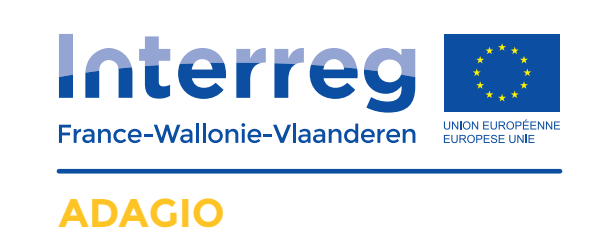Interreg France-Wallonie-Vlaanderen - ADAGIO

Introduction
The project deals with the development of nutritional solutions to safeguard digestive health in production animals and beyond. It is coordinated by Institut Polytechnique UniLaSalle (Beauvais), and has as partners Sanluc International, Ghent University, Génoscreen, and Algofit Solutions. This project is 3-year long.
Project description
The entire Haut de France-Wallonia-Flanders basin is a region rich in agricultural and agrifood activities. However, in recent years, the development and sustainability of the meat industry have been compromised. One of the most restrictive measures comes from the ban on the use of antibiotics / growth promoters in farms. In addition, consumers are primarily looking for quality products (organoleptic and nutritional but also free from any residue) without, however, always being able to accept a significant increase in the cost of these foods. To try to respond to this double constraint, the ADAGIO project proposes to create and demonstrate the impact of a nutritional solution allowing the establishment of intestinal mechanisms leading to good digestive health in production animals. The France-Wallonia-Flanders basin being also one of the regions where the prevalence of digestive pathologies is among the highest in Europe.
Objectives
The objective of ADAGIO is to make this solution available for animal feed but also to study the possibility that this solution could be the basis of food supplements for human us.
Role of Ghent University
The Laboratory for Animal Nutrition and Animal Product Quality (LANUPRO) is in charge for the in vivo evaluation of the nutritional solution in established animal models.
Dutch summary
In het hele bekken Hauts-de-France-Wallonië-Vlaanderen zijn de landbouw- en de agrovoedingsactiviteiten sterk vertegenwoordigd. De laatste jaren komen de ontwikkeling en de duurzaamheid van de vleessector echter in het gedrang. Een van de meest beperkende maatregelen komt voort uit het verbod op het gebruik van antibiotica en groeibevorderaars in de kwekerijen. Bovendien zoeken de consumenten vooral naar kwaliteitsproducten (organoleptische en nutritioneel, maar ook vrij van residuen), zonder evenwel bereid te zijn hiervoor een hogere prijs te betalen. Om te proberen te antwoorden op deze dubbele beperking, stelt het project ADAGIO voor een nutritionele oplossing te creëren en de impact ervan te bewijzen die het mogelijk maakt de implementatie van darmmechanismen te bevorderen die leiden tot een gezonde spijsvertering bij gebruiksdieren. Het eerste doel is deze oplossing voor diervoeders ter beschikking te stellen, maar ook de mogelijkheid te bestuderen dat deze oplossing de basis kan vormen voor voedingssupplementen voor de mens. Het bekken Frankrijk-Wallonië-Vlaanderen is immers ook een van de regio’s met de hoogste prevalentie van spijsverteringsziekten van Europa
French summary
L’ensemble du bassin Haut de France-Wallonie-Flandre est une région riche en activités agricole et agroalimentaire. Cependant, ces dernières années, le développement et la pérennité de la filière viande sont mis à mal. L'une des mesures les plus contraignantes provient de l’interdiction de l’usage d’antibiotiques/facteurs de croissance dans les élevages. De plus, les consommateurs recherchent en priorité des produits de qualité (organoleptique et nutritionnelle mais aussi indemne de résidus quelconques) sans toutefois toujours pouvoir accepter une hausse conséquente du coût de ces aliments. Pour essayer de répondre à cette double contrainte, le projet ADAGIO propose de créer et de mettre en évidence l’impact d’une solution nutritionnelle permettant de favoriser la mise en place de mécanismes intestinaux conduisant à une bonne santé digestive chez l’animal de rente. Le premier objectif est la mise à disposition de cette solution pour l’alimentation animale mais aussi d’étudier la possibilité que cette solution puisse être la base de compléments alimentaires à destination humaine, le bassin France-Wallonie Flandre étant également une des régions où la prévalence des pathologies digestives figure parmi les plus élevées d’Europe.
Website
Contact
Prof. Joris Michiels
Department Animal Sciences and Aquatic Ecology
Phone number: +32 9 264 90 00
E-mail